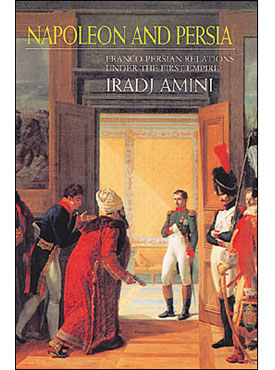About the Book
Franco-Persian relations have long been neglected by Napoleonic scholars, however, they show how Napoleon’s political and strategic thinking extended far beyond the frontiers of Europe. Begun in 1802 under the Consulate, those relations culminated in the signature of the Treaty of Finkenstein, on 4 May 1807, and the dispatch of the Gardane Mission to Tehran. For Napoleon, who was then fighting the Tsar’s forces in Poland, the Persian alliance served a dual purpose. While it created a temporary diversion against Russia, it also threatened British interests in India.
This Franco-Persian alliance, which brought Persia into the realm of international rivalries, might have survived had Napoleon kept his part of the bargain. However, having made his peace with the Tsar at Tilsit, in July 1807, and anxious to extricate himself from the Spanish quagmire, he sacrificed Persia’s interests to his own in Europe. To the British, who were waiting on the sidelines, Napoleon’s about-face was a windfall. Having long wished to dislodge the French from Persia, they were pleased at last to take their place in 1809.
This volume discusses in detail those years of delicate diplomacy, complicated by the problem of distance, the intrigues of Britain and the intransigence of Russia. The dangerous existing conditions, the unique personalities of the protagonists, and the formidable subtlety of the Persian make this a riveting tale of international politics.
Written in a style which brings together historical facts and entertaining anecdotes, Napoleon and Persia will appeal not only to scholars, but to a wide readership interested in the history of Europe, military studies, and international relations
Reviews
“Using private and official English and French primary sources, Iradj Amini gives us a clear and vivid description of Napoleon’s diplomatic adventures in Persia.”
- —Le Quotidien de Paris
“Napoleon and Persia is enhanced by ample scholarship and a flowing style.”
- –Le Monde
“Iradj Amini gives us a remarkable study of Franco-Persian relations.”
- –Figaro
“…an enthralling book… Amini tells the story with verve and humor, blending scholarship with skillful storytelling…. A remarkable book, admirably translated…and beautifully illustrated…”
- –Times Higher Education Supplement
Excerpt
The Marie Petit affair
At the beginning of the 18th century, Louis XIV and his ministers decided to send an ambassador to Persia. Their choice fell on Jean-Baptiste Fabre, a merchant from Marseilles who had lived in Constantinople for a long time but was then in France. To impress the court of the Sophy they conferred on him the title of Ambassador Extraordinary. He left Marseilles in March 1705…
To combine business with pleasure, Fabre also decided to take his mistress, the adventurous Marie Claude Petit, with him to Isfahan. An account of the extravagant incidents and scandals that followed as a result would lead us too far from our subject. Suffice it to say that the sudden death of Fabre, some time after his arrival in the Persian city of Erivan, far from subduing Marie, fanned the flame of her ambitions.
Snapping her fingers at the traveling companions’ choices of a successor for Fabre, she proclaimed herself head of the mission “in the name of the princesses of France” and took possession not only of the over’s personal effects, but also of the presents for the Shah and the documents of the mission.
Meanwhile news of Fabre’s death and of the subsequent events in Erivan had reached Ferriol, the French ambassador to Constantinople. Without waiting for orders from France, he at once dispatched his young secretary Pierre-Victor Michel to Persia, with orders to overtake the mission, to take charge of it and to send Marie Petit back to France.
Michel caught up with the mission in Tabriz. However, he was unable to dislodge Marie, as she was now under the protection of the city’s Governor, as a result of a letter of recommendation from the Khan of Erivan. Having talked to her and thinking that he had persuaded her to stay in Tabriz while he went to see the Shah, Michel proceeded to the Persian court, which was then encamped some distance to the south of Tehran.
On his way, he stopped in Qazvin, where he was well received by the Governor. However, his satisfaction was short-lived, for the day after his arrival Marie Petit also reached that city, armed with letters of recommendation from the Khans of Erivan and Tabriz. As a result, she was allowed to go on to the court, while Michel had to remain in Qazvin.
On her arrival at court she was received by the Prime Minister, who conducted her to the royal harem, where according to her own account she received “all possible honors”. On the following day, after being given her congé by the Shah, she returned to Tabriz.
In the meantime Michel, after some delay, had also been able to make his way to court. However, having been prevented by his enemies from seeing anyone of importance, he was forced to retrace his steps. In Tabriz, he found Marie. She had been ill, and was in a chastened and contrite mood. Upon her humble request, he provided her with an escort and traveling money to return to France…
… Marie Petit was arrested upon her return to Marseilles in February 1709, and imprisoned in in a convent on charged of having scandalized the Orient by her behavior, planned to embrace Islam, misappropriated the presents intended for the Shah and caused the death of several Frenchmen. It was more than enough to have her condemned to the burnt at the stake.
However, upon Ferriol’s recall from Turkey in 1711, Fabre’s widow returned from Constantinople, and although she had every reason to hate her late husband’s mistress, she gave evidence on her behalf. It was probably her intervention which led the judicial authorities to take a more lenient view of Marie’s conduct, and in 1713 she was released
About the Author
Iradj Amini was born in Tehran in 1935 and educated in the United States, Iran and England. He joined the Iranian Foreign Service in 1965 and served as Ambassador to Tunisia. Now working as a journalist, he has lived in Paris since 1992. For Mage Publishers he wrote the book Napoleon and Persia: Franco-Persian Relations Under the First Empire. Mr Amini can be contacted via e-mail.








